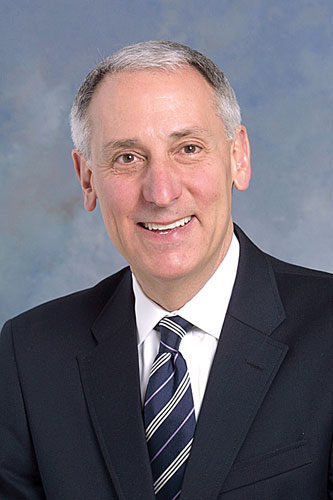.jpg)
For 90 years, Hillel: The Foundation for Jewish Campus Life has provided what many call a “tent” welcoming students of every Jewish background and denomination on campus. But as Hillel named its next president and CEO, questions persist over how open that tent should be when it comes to opinions about Israel.
Hillel was created in 1923 at the University of Illinois, Urbana-Champaign, and was adopted by B’nai B’rith International in 1924 until the 1990s. The organization has grown to more than 500 campuses across North America.
In a search process characterized as “wide-ranging and open,” Hillel considered candidates with academic, corporate and/or Jewish community leadership experience to replace outgoing President and CEO Wayne Firestone. Published reports detailing the search process indicate that 325 individuals have been considered, and that more than 200 were personally contacted. The official announcement came July 15 with the naming of former Ohio congressman Eric Fingerhut—who also oversaw the Ohio Board of Regents, the state’s coordinating board for higher education—as its next president and CEO.
“I am honored to be joining such an esteemed and important organization,” Fingerhut said in a statement. “Everything in my life has led to this moment—my public service, my work on campuses and research centers across Ohio, and my lifelong devotion to Israel and the Jewish people. And so I couldn’t be more thrilled.”
National Hillel guidelines state that Hillel will not “partner with, house or host organizations, groups or speakers that delegitimize, demonize or apply a double standard to Israel.” But as Hillel experiences transition at the top, activist NatanNestelhas been voicing concern about how open Hillel’s tent is.
The former chairman of the Israeli Students Organization in North America (which he founded as a student at the University of California, Berkeley), Nestel is concerned that Hillel has allowed proponents of the anti-Israel Boycott, Divestment and Sanctions (BDS) movement to gather under Hillel’s tent. Nestel has created a documentary he said details the activities of pro-BDS groups on the UC Berkeley campus.
Nestel told JNS.org that groups that demonize Israel should be outside of the “big tent” on campus.
“Nominally Jewish groups, including those who assist anti-Israel groups and speakers to come to campuses, should not be included [in the tent],” Nestel said. Nestel cited the self-labeled “pro-Israel, pro-peace” group JStreet, which he said sponsored the appearance at Berkeley of Breaking the Silence, an Israeli group that defames the Israeli army for “war crimes,” “crimes against humanity,” “ethnic cleansing” and “violations of human rights.”
Larry Sternberg, executive director of Hillel at Brandeis University, responded to Nestel’s criticism of Hillel by saying, “Unless he has specifics about how many people ascribe to specific movements, his broad statements are not necessarily factual.”
But Sternberg acknowledged that at a campus like UC Berkeley, “a student may feel besieged.”
“Nestel may feel that the battle is the center focus on campus,” Sternberg told JNS.org.
Sternberg, however, said the opposite is true on most campuses. “While BDS must be fought, it is not center stage,” he said.
Sternberg asked, “What is the reality check on rhetoric that says Hillel should be forbidding something? Even if Nestel wants to say Hillel should enforce its tent, suggesting that Hillel can control what is outside its tent is useless.”
JStreet leaders challenge the claims of critics such as Nestel who say the group should be placed outside of Hillel’s tent. Simone Zimmerman—president of the national student board of JStreet U, the group’s campus arm, and a graduate of UC Berkeley’s class of 2013—told JNS.org that JStreet U is giving a new voice to students who “otherwise wouldn’t find a place in Hillel.”
“I think JStreet U has been really essential in helping more students in Hillel engage with Israel and develop a more nuanced and complex and meaningful relationship with Israel as American-Jewish students,” Zimmerman said.
Nestel detailed his concerns about JStreet, and about Hillel’s reaction to JStreet’s campus activities, in a February 2012 op-ed for the Jerusalem Post.
“JStreet is already entrenched at Berkeley’s Hillel and the JSU (Jewish Student Union),” Nestel wrote. “The Hillel group, Kesher Enoshi (KE), is its proxy there. This year KE, along with JStreet U, brought the founder of the Sheikh Jarrah Solidarity Movement in to speak at Hillel. He demonized Israel, proclaiming, ‘Jerusalem is a symbol of evil.’ Berkeley’s Hillel director argued that this was ‘within the framework of national Hillel’s Israel policy.’”
Zimmerman, however, noted JStreet U’s efforts to respond to BDS on UC Berkeley’s campus and others.
“When BDS came up four years ago [at UC Berkeley], we weren’t an official group on campus yet, but many of us who went on to found our JStreet U chapter on campus were very involved in the Hillel organizing against BDS,” she told JNS. “And this year, when we had another divestment resolution considered, student leaders from within Hillel, leaders of the pro-Israel groups, actually reached out to us and asked for our help to be part of the anti-divestment effort.”
Columnist Daniel Gordis, like Nestel, has questioned the inclusion of JStreet in the pro-Israel tent on campus.
“Is JStreet in the tent, or out?” Gordis asked in a Jerusalem Post op-ed. “It’s one thing to put ‘pro-Israel’ in your tagline, and another to be ‘pro-Israel’… Even a big tent, though, has its limits.”
Sternberg, however, told JNS.org his experience with JStreet has been “very different.”
“At Brandeis, JStreet works loosely with AIPAC (American Israel Public Affairs Committee); both envision a two-state solution,” Sternberg said.
By Maxine Dovere/JNS.org












